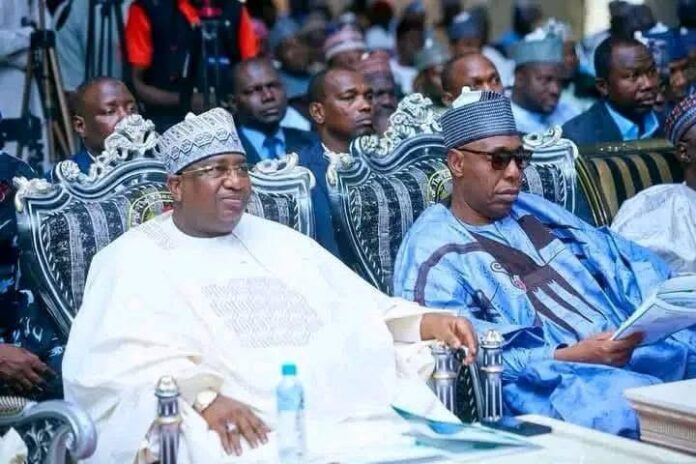By Yakubu Ahmed BK
In the age-old adage, “birds of a feather flock together,” we find an intriguing insight into the nature of human connections. When individuals from divergent geographical corners (as distant as it is between Borno and Kebbi) forge bonds, especially in a politically vibrant environment like ours, it undoubtedly sparks curiosity and speculation. The friendship between the Governors of Borno and Kebbi states Professor Babagana Umara Zulum and Comrade Dr Muhammed Nasir Idris serves as a testament to the profound impact of interpersonal relationships in a challenging landscape.
As we explore the backgrounds of Governors Zulum of Borno and Idris of Kebbi, we uncover a rich tapestry woven with threads of shared aspirations, common grievances, and a distinct vision for their constituents. Their friendship extends beyond mere camaraderie, reflecting a commitment to justice, fairness, and socio-economic upliftment for their respective communities. Though separated by distance and tribal differences, they found themselves dancing towards each other by the commonality of their sense of service and commitment to transparency and an interconnecting drive and thirst for growth of their people.
The governors are increasingly recognizing the importance of unity—not just between themselves, but as a means of strengthening a national fraternity that ultimately benefits their states and Nigeria as a whole. Through collaboration, they and other constituents making the Nigerian nation can build bridges where once there were divides—promoting peace, inclusivity, and mutual understanding.
The history and cultural narratives of Borno and Kebbi states resonate with deep-rooted similarities. Both were shaped by the historical currents of Islamic scholarship and traditional values, making them not only centers of cultural heritage but also regions rich in potential. Kebbi, carved from the ancient Sokoto state in 1991, and Borno, the elder of the two, with its illustrious legacy of religious and cultural excellence, share more than cultural heritage; they also confront similar socio-economic challenges.
Despite the geographical distances that separate Borno from Kebbi, the connection has always been strong. The two states have engaged in commerce and religious cooperation, actively fostering a shared vision for economic prosperity while advancing the frontiers of Islamic civilization. The modern age presents new opportunities that technology has made accessible, offering avenues for enhanced collaboration.
Historically, Borno has been a welcoming refuge for those seeking knowledge and economic opportunities, particularly from Kebbi. Families from Kebbi have made Borno home, contributing to vibrant communities built around shared agricultural practices, commerce, and Islamic education. Settlements near water points, such as Alau Dam, Zabarmari and Dusuman very close to Maiduguri and as far as on the shores of Lake Chad and other various rice farming and fishing areas, showcase the fruitful interplay between resource access and communal living.
It is a remarkable evolution that the people of Borno, once hesitant to journey far northwest for opportunities, have expanded their horizons. Since the early ’90s, Borno citizens have sought economic advancement in Kebbi and other Hausa/Fulani regions—a testament to their drive and ambition. The successful ventures of Kanuri individuals in Kebbi, from commerce to property ownership, further emphasize the potential for inter-state collaboration.
As Zulum and Idris deepen their ties, it signals a noteworthy shift in leadership dynamics—an acknowledgment of the pressing need to take control of their destinies and foster a cohesive relationship among likeminded leaders. Their commitment to working together exemplifies the values of empathy, solidarity, and shared purpose necessary for progress.
The frequent visits between the two governors have not gone unnoticed, generating speculation about their intentions. However, the undeniable fact remains: Zulum and Idris have both demonstrated an unwavering dedication to the principles of people-oriented leadership. They embody the notion that governance is fundamentally about the relationship between leaders and their constituents.
Their backgrounds as educators have instilled in them a profound grassroots appeal. Though Zulum has held his gubernatorial position for four years longer than Idris, their shared challenges of their respective states-including addressing economic disparities and security concerns—have naturally aligned their paths towards collaboration.
Compassion and a selfless approach to leadership characterize Idris’s journey, one that has seen him evolve from a labor leader to a state governor. His tenure reflects a commitment to uplifting the underprivileged and addressing systemic issues within a historically neglected region. He bacame Governor of Kebbi at a time the people of the state have totally given up hope on the kind of progress and infrastructural development they see in other states.
Facing the insurgency in Borno poses challenges unique to Zulum, yet these difficulties only amplify the urgency of collaboration between the two states. Similarly, Kebbi’s persistent struggles with dilapidated infrastructure and underdevelopment offer a poignant reminder of the work both governors must undertake to drive meaningful change.
Both Borno and Kebbi remain rich in resources and potential; together, they can harness agriculture, livestock, and mineral wealth to foster an environment conducive to prosperity. Their complementary strengths—resilience, industriousness, and an unyielding spirit—set the stage for an unprecedented partnership.
The pressing need for bridge-building transcends political affiliations and cultural boundaries. It is imperative that both leaders engage with critical stakeholders, forging alliances that cut across all strata of society. By prioritizing collaboration over division, they can create a foundation for sustainable growth.
Ultimately, the relationship between Zulum and Idris embodies a promising vision for Nigeria, reflecting the virtues of fraternity—friendship, integrity, empathy, and shared purpose. Their collaboration could serve as a blueprint for other states, illustrating that unity in diversity is not merely an ideal but a pathway to transformative change.
As we look ahead to a future shaped by their leadership, it is heartening to witness the emergence of a bond that seeks to uplift both Borno and Kebbi states.
Ahmed BK is the Commissioner for Information and Culture Kebbi state. He has lived and worked as a journalist in Borno for upward of three decades and has thus garnered modest knowledge in the political history of both states.


